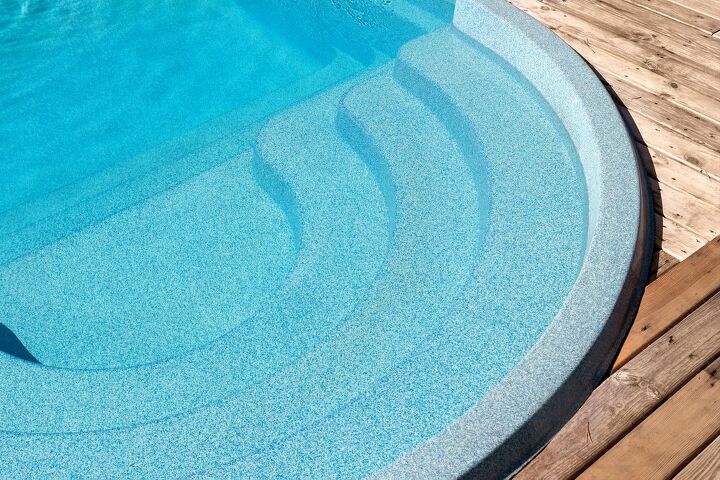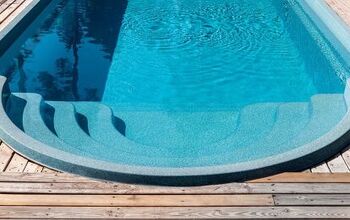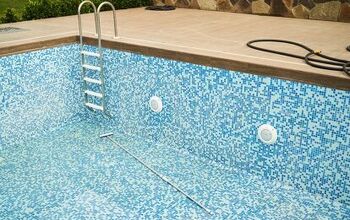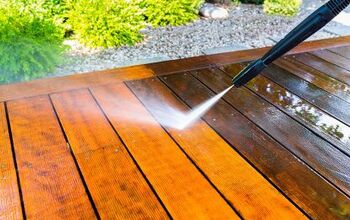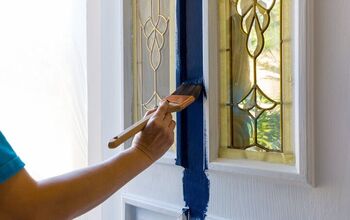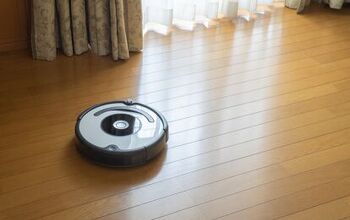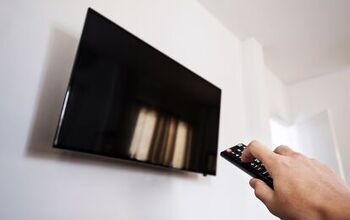Can You Acid Wash A Fiberglass Pool? (Find Out Now!)

When you are ready to go for a swim in your pool, there is nothing better than seeing the sun reflected in its crystal clear surface. However, over time you may begin to notice stains beginning to build up in your pool to dull its shine. A quick acid wash could restore the beauty of your pool, but will it damage your fiberglass pool?
You can acid wash your fiberglass pool to remove stains, however, you will want to make sure to dilute the acid properly to protect your pool’s gel coating. Harsher acids can destroy your pool’s resin finish, while acids such as ascorbic acid are more fiberglass-friendly. Regular pool maintenance will be key for keeping a clean pool, but an acid wash can be used from time to time for an extra shine.
We’ve laid out some tips for acid-washing and added some tricks to keep your pool looking its best.
Do You a Need Pool, Spa, or Hot Tub Contractor?
Get free, zero-commitment quotes from pro contractors near you.

When to Acid Wash Your Fiberglass Pool
A plus of choosing a fiberglass pool is that it requires much less maintenance than a concrete pool. While a concrete pool is made of porous material that is an easy target for algae and mold, a fiberglass pool is much more resistant to this type of build-up. A fiberglass pool can go for 5-7 years without needing a deep clean if it is properly maintained.
When your fiberglass pool does need an overall clean, you will need to take care not to damage the pool’s gel-coated finish. If you choose to acid wash your pool, make sure you are following directions that are specific to a fiberglass pool and using materials that are fiberglass friendly. Generally, an acid wash cleans by taking a thin layer of your pool’s lining with it. So, with a fiberglass pool, you will want to err on the side of safety so you don’t end up causing damage to your pool’s gel coating.
What Kinds of Acid Are Best to Use in a Fiberglass Pool?
Most people that choose to acid wash their fiberglass pool choose to use either muriatic acid or ascorbic acid.
Muriatic Acid
Muriatic acid is a type of hydrochloric acid that is often used to clean concrete pools. Experts vary in their opinions when it comes to using muriatic acid to clean a fiberglass pool, however. Some experts say that muriatic acid is too strong for a fiberglass finish, while others believe that it should not damage fiberglass if it is used in small amounts. If you are using muriatic acid, make sure you use proper protection so you don’t inhale the powder or fumes.
Ascorbic Acid
Ascorbic acid may be better known simply as Vitamin C. This is a more natural acid and most experts seem to agree that this is a safer option for fiberglass than muriatic acid. Some pool-owners attack stains directly with vitamin C tablets, while others use ascorbic acid that is specifically designed for acid-washing your pool such as Stain-Free.
The After-bath
After giving your pool an acid wash, you will need to check the pH and alkalinity of the water before going back in for a swim. Adding acid to the water to clean your pool can significantly change the chemical balance of the water.
Note: It is important to note that you can acid wash a pool with water still in it. Do not attempt to drain a fiberglass pool on your own. Draining a fiberglass pool can cause damage to the interior lining and could even crack the pool’s shell. To drain your pool, you will need to call in a professional.
Fiberglass Pool Maintenance Do’s and Don’ts
With proper maintenance, you can hinder the build-up of rust stains, calcium deposits, and mold. Here are tips to keep the sparkle in your pool:
- Do remove bugs, leaves, and other debris from your pool regularly.
- Don’t drain your fiberglass pool on your own.
- Do make sure the water level stays above the skimmer.
- Don’t let the water level drop more than 2-3 inches below the skimmer.
- Do use cleaning products appropriate for a fiberglass pool.
- Don’t use harsh substances which can damage your finish.
- Do use a pool filter.
- Don’t allow your water to become imbalanced.
- Do use a pool cover when your pool is not in use.
When to Call in an Expert
If your pool has been left unattended for an extended period, or has an unusual amount of debris, it may be a good investment to call in an expert. A pool expert will be able to drain your fiberglass pool and do a thorough clean.
Related Questions
Is muriatic acid dangerous?
Muriatic acid can be toxic if inhaled. If you inhale fumes from muriatic acid it can cause allergy-type symptoms. These can include coughing, choking, or shortness of breath. Prolonged or repeated exposure to muriatic acid can cause damage to your respiratory system.
Can a fiberglass pool crack?
Fiberglass pools may show hairline cracks over time. These cracks will usually only be in the gel coating and should not be structural. If you see blisters in the gel coating, this indicates that the gel coat was not applied thick enough, or it could be signs of age.
Will hydrochloric acid dissolve fiberglass?
Hydrochloric acid with a 38% concentration can slowly dissolve the gel coating of your fiberglass pool. Some pool experts suggest avoiding hydrochloric acid entirely, while others suggest that using it in small amounts should be fine. Make sure you properly dilute any acids you use in a fiberglass pool.
Do You a Need Pool, Spa, or Hot Tub Contractor?
Get free, zero-commitment quotes from pro contractors near you.

Summing It Up
While you can clean a fiberglass pool with acid, it is important to use the appropriate ratio so your solution won’t adversely affect the gel coating of the pool. Spot-cleaning can be the first method you try, but from time to time, you may want to give your pool a more thorough clean. Most experts are in favor of using ascorbic acid if you want to acid wash your pool. This is as not as harsh as muriatic acid, but can still leave you with that crystal-clean pool you are wanting.
Related Guides

Alex Praytor is a native Texan who got her degree in English Literature and decided to travel the globe. She finds the architecture and design of homes across cultures fascinating. In her spare time, she visits coffee shops with her family and creates projects for their own home. Alex enjoys sharing tips on how to keep repairs up to date while turning a house into a home.
More by Alex Praytor



